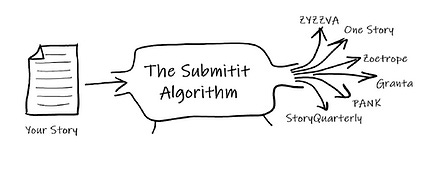"You Have to Read the Journals." A Chat with Erik Harper Klass, Founder of Submitit
Founder of submitting service for writers takes us through his submitting algorithm
It’s the first day of summer, friends, and I bring news of another interview, newly wrapped!
Today I had the great fun of chatting with Erik Harper Klass, founder of Submitit. This is a service that “takes the guesswork out of submitting to literary journals.” For writers who don’t have the time or bandwidth to read and research hundreds of lit mags, or who want to spend less time formatting their work and submitting to magazines and more time just writing, Submitit may be of interest.
Erik started the service in 2020, after realizing that the data and notes he was collecting from his own submissions process might be useful to other writers. In the beginning, he found a handful of fiction writers in lit mags whose work he admired and asked if he could submit new fiction for them. What followed was a consistent enough success rate that he decided to officially launch Submitit.
In the process, Erik developed an algorithm for lit mag submissions. There were no short-cuts, of course. The algorithm came after reading hundreds upon hundreds of literary magazines. As he read, Erik created criteria by which to analyze a journal. These included assessing if the magazine was experimental or not, if the writing was “lyrical or stylized,” how difficult the writing was, whether the focus was international or domestic, topicality of the works, length, and more. He also plugged in data from Duotrope, such as a magazine’s acceptance rate and volume of submissions.
Now, I always tell people that submitting to lit mags is not a perfect science. But Erik just might prove me wrong. Since employing his algorithmic technique, he has achieved an impressive 66.6% acceptance rate!
In today’s conversation, we discussed oh so many things about the submissions process. What are some revision strategies for fiction writers that may promise a higher chance of success? What patterns does he notice in the kind of work that gets accepted? When submitting to lit mags, do writers need to “dumb down” their work? What does it mean to “dumb down” one’s work in order to make it marketable?
Another thing I wanted to know was how his clients manage their publication goals. What is the sweet spot between wanting to get published in one magazine, any magazine, just so we can share our work with all our friends right away, and really holding out for the high-caliber lit mags whose pedigree might offer larger career benefits?
I was also curious about what it might mean to apply scientific methods to the art-making and submitting process. If there are predictable formulas that will make our work more publishable in certain top-tier journals, are we taking the art out of our work? Does too much data drive away the mystery?
Needless to say, I had so many questions for Erik! His answers were illuminating, funny, and highly informative. You’ll have to check out the video to hear them all!
To everyone who came out today to watch and ask questions, thank you for tuning in! Your faces bring me such joy!
And, thank you to Erik for taking the time to explain the goings on at another nifty literary venture.
Happy viewing!





This was a really interesting interview. Becky, how people read and get to know lit mags would be an interesting discussion topic. Like, do people subscribe, check out some online every week, make a practice of it? I randomly bought a bunch of lit mags a year or two ago and occasionally pick them up and read them, but I'm not able to purchase enough to feel like I really KNOW the mag. I need to be better about reading online. I also wish LA public library had a regular rotating stock of lit mags. Doesn't it seem like that would be a win win for the library and for lit mags? I assume they must have left over stock constantly. Anyway, I'd be so curious to hear how other people find their fave mags!
While no doubt Submitit's algorithm is very helpful and the services provided, according to the testimonials, helpful. Unfortunately the costs involved are out of the reach of low income writers like me, as is so often the case. Becky, it would be really helpful if someone from your wide circle could try it and write an independent review of their experiences.